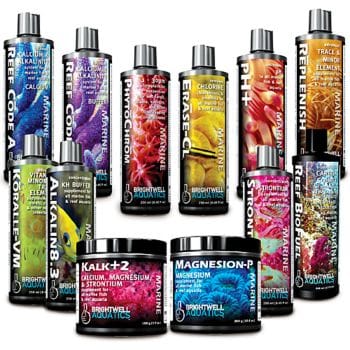About Aquarium Additives
Additives are perhaps the most confusing part of the saltwater hobby. When you walk into a fish specialty store there are often rows of pretty looking bottles that just scream “Buy Me!” So you take a closer look, but there seems to be a supplement for everything. Do I need to use additives, and if so, what additives should I be using?
No, you don’t need to use additives and other supplements to have a successful reef aquarium. Then why do they sell additives? To help make your aquarium the best that it can be. With additives you don’t always get measurable results, some will have positive effects and some can even have negative effects on your aquarium. When selecting an additive you generally get what you pay for! Low quality additives will have little or no positive effects on your aquarium. Additives will have many different names, do you best to figure out which category they fall under.
Popular Aquarium Supplements
A Coral Calcium Supplement should be added by aquarists keeping a number of stony corals. Calcium is used by corals to grow. Calcium additives come in easy to use liquid bottles and dry mixes. Most Calcium additives contain Calcium Chloride and other agents to make the supplement more ionically balanced. For most hobbyists calcium levels can be maintained by routine water changes. Be sure to have a Calcium Test Kit.
Alkalinity should be added by hobbyists maintaining a number of stony and soft corals. Alkalinity is used by corals to grow. Alkalinity additives come in easy to use liquid bottles and dry powders. Most Alkalinity additives contain Soda Ash or Sodium Bicarbonate and other agents to make the supplement more ionically balanced. Two Part bottles of calcium and alkalinity are typically sold together and are designed to be ionically balanced. If you dose liquid calcium and alkalinity, add them at separate times to prevent them from calcifying in the water. Usually ten minutes apart is enough. Most Alkalinity additives also act as a buffer, and like all buffers they will only temporarily raise pH. Be sure to have an Alkalinity Test Kit.

Stontium, Molybdenum and Iodine. These supplements are present in acceptable levels in most salt mixes and don’t need to be dosed. Iodine should only be used by the advanced aquarist with the proper Iodine Test Kit because it is easily overdosed.
Trace Elements and Amino Acids. These products are often marketed to enhance coral growth and coral color. Be careful when purchasing these products, as you get what you pay for. These products do work for most advanced hobbyists with well established reefs, but the average hobbyist will see little or no visible results.
Aquarium Food Additives
Phytoplankton and Other Coral Foods. For the average hobbyist, phytoplankton will increase coral polyp extension and greatly increase algae growth. Advanced hobbyists keeping carnations, sun polyps and gorgonians can use Phytoplankton to feed these corals. Another excellent coral food is Cyclop-eeze. You will see the immediate benefit of adding Cyclop-eeze into your aquarium as corals will extend their polyps to feed and fish will go into a frenzy.
Fish Vitamins and Supplements are definitely worthwhile. Look for supplements containing Omega Fatty Acids, Vitamin C, Garlic and Spirulina. These simple food additives will greatly boost your fish’s immune system and ability to fight off disease. It will also enhance the color and vibrance of most fish.
As a final note, when purchasing an additive, read the label and determine if the product sounds too good to be true. There are many worthwhile additives and supplements available, but remember to purchase only high quality additives as they will have the greatest positive effect on your aquarium. Avoid additives with questionable packaging or that leak. If you were to purchase two additives, select a Coral Food Supplement and Fish Vitamin as it will have the greatest immediate effect on your fish tank.
